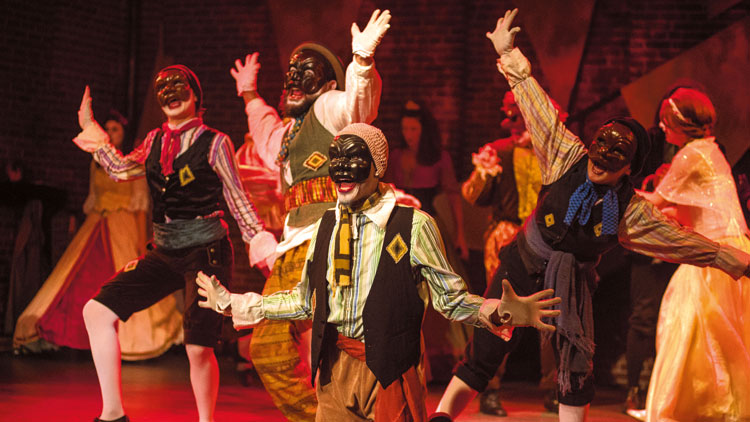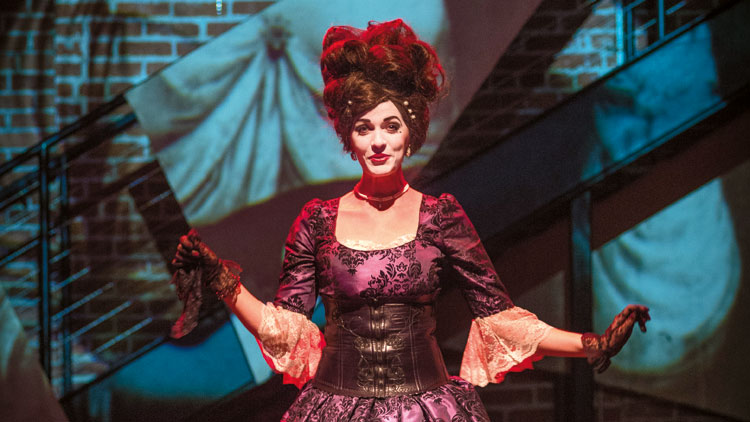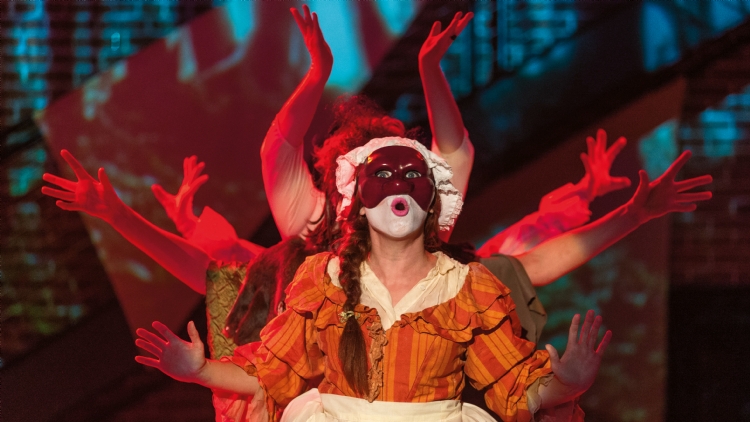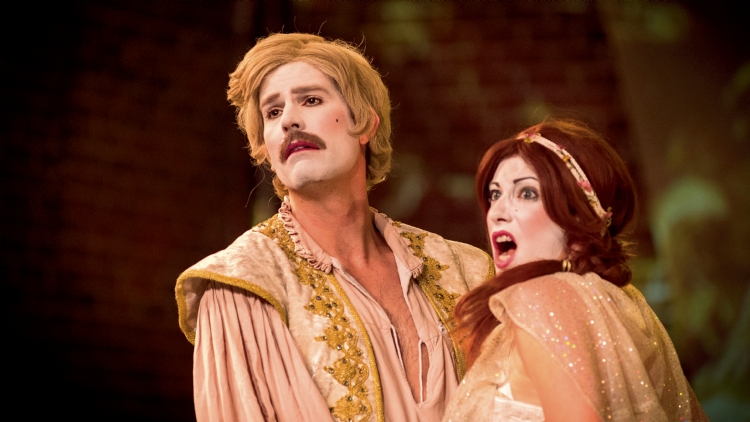For Tim Robbins, theatre is the
last bastion of truth, a place
where artists can explore ideas
without having to answer to
corporate sponsors – a place of
unfettered innovation. ‘How do
you go outside the box when you’re doing a
movie for 30 million dollars?’ he says. ‘How
do you test the boundaries when you’re
beholden to a major investor who needs
to make money? A lot of theatre is telling
stories you’ll never see on a big screen.’
This was the motivation behind founding
Actors’ Gang, Robbins’ theatre company
now celebrating its 35th year and touring Shanghai this November with their latest, Harlequinio: On to Freedom (pictured below). Those who
remember his roles in Mystic River, The
Player, Bull Durham and The Shawshank
Redemption may not realise that
a film career that includes an
Academy Award, a Golden
Globe and countless
other honours was
initially about funding
his theatre company.
Their first play
was Ubu Roi (Ubu
the King), Alfred
Jarry’s satire that
caused riots upon
its 1896 debut, but
is now credited with
influencing the surrealist
and Dada movements. ‘I
have always been attracted
to theatre that has a larger canvas,
that involves subject matter that concerns
[the whole world],’ he says. ‘And this was the
craziest play I’d ever read, with directions
like “a malcontent explodes”.’
Clearly, Actors’ Gang was never meant
to be a mainstream operation; rather,
Robbins calls it a laboratory where like-minded
artists can create innovative work.
He credits his development as an actor,
director, and writer to working with the
company, where he learned to mould and
reinterpret pieces for stage and film. ‘I
could work on an idea, [without getting] the
approval of a studio or millions of dollars to
realise it,’ he says. ‘I still spend more time in
my theatre than I do on movie sets.’
But to Robbins, theatre is as much a
creative exercise as it is a societal
endeavour. Actors’ Gang runs
education programmes in
American schools and holds
free after-school student
workshops. But above all,
the play’s the thing. The
company’s 2016 Season
of Justice revives earlier
works such as George
Orwell’s 1984 and Erik
Jensen and Jessica Blanks’
The Exonerated, about six
prisoners wrongly condemned
to death, both of which Robbins
feels reflect the ‘overreaching
powers of the [US] government in our lives,
and the broken criminal justice system’. The
latest addition is Robbins’ Harlequino: On
To Freedom, about a Commedia dell’Arte
troupe that hijacks a professor’s lecture.
This brings the Renaissance comedy
tradition into modern times, asking
modern questions.


In artistic terms, Commedia dell’Arte –
the 16th-century Italian comedic theatre
tradition in which the actors wear masks
– propelled Western theatre forward, greatly
influencing Shakespeare, vaudeville and
more. Commedia dell’Arte plays were
satirical and edgy: stock characters would
enact stories about young lovers facing
obstacles, foolish or self-important old
men, vainglorious captains, and, most
importantly, the clever servant, best known
as Harlequin, who pulls the story together.
Robbins’ play was inspired by a historical
account of Vincenzo Gonzaga, Duke of
Mantua, who watched a Commedia dell’Arte
performance then asked who wrote the
story. When three actors raised their hands,
he accused them of arrogance and ordered
them imprisoned, tortured and hanged (the
sentence was later commuted). Robbins
was intrigued. ‘To me, this was a Spartacus
moment; they were protecting each other.
I think the court record is an attempt to
rewrite history so he doesn’t come off
looking so bad – my suspicion is that he flew
into a rage about something in the script.’
The fact that Commedia dell’Arte had
no physical scripts for at least 80 years
suggests that the material was improvised
or incendiary – or both. ‘[Troupes] weren’t
contracted for long runs; it was basically
set up a stage and get the hell out of town,’
he says. He points out that today’s street
performers still use politically relevant
material, which in the 16th century involved
war, religious divisions, and economic
inequality. ‘Just like today,’ says Robbins.
They also had, Robbins reminds us, a
nascent slave trade, where for the first time
people were being kidnapped and sold on
the open market. ‘Then, 40 years later,
Commedia emerges as an art form where
the main character is a slave,’ he says. ‘I
believe there’s a connection there.’


Robbins wants Harlequino to raise
questions about society’s power dynamic
that prevents certain stories from being
told, about history being written by the
victor, and about whose story should be
told, master or slave. He also asks about
the difference between servitude and
slavery, and reminds us that servitude
comes in all forms. This includes American
university graduates owing hundreds of
thousands of dollars, forcing them to seek
high-salary jobs instead of those they have
a passion for. ‘You’re telling them you can’t
volunteer for two years to help society, you
can’t teach inner city kids; you’ve got to pay
this off if you have any chance of surviving.
It’s obscene. This is one reason you see
so much disillusionment in our country,’
he says, adding that we have to rely on the
entitled, loan-free graduates to fill the gaps.
‘I’m not sure we can count on them to take
all the teaching jobs.’
Of course, servitude doesn’t come any
worse than the penal kind, and here too,
Robbins walks the walk. The celebrated
1994 Shawshank Redemption was filmed
in a working prison, and Robbins spoke
to inmates and ‘right-wing, Republican
guards’, who blamed the US’s draconian
drug laws for a system that incarcerates
those with marijuana possession
convictions alongside violent offenders.
‘There’s a waiting list for [high school
equivalency] programmes, there’s a waiting
list for job training, but in the meantime they
have to survive,’ he says. ‘Inmates never get
anything but an education on how to be a
better criminal.’
The Actors’ Gang Prison Project teaches
theatre workshops to inmates. One
prisoner started his own company, training
40 new members, and making costumes
from papier mache and shoe leather from
their prison-issue boots. ‘Prison officials
love it,’ says Robbins. ‘When [inmates]
are attuned to their own emotions, they
can work out problems more easily with
other prisoners.’
The project started at one prison with
private funds; now the group covers eight
prisons and receives State funding. Studies
indicate that the infractions among inmates
involved decreased by 89 percent, and that
their recidivism has halved. To Robbins,
these prison workshops fuelled Harlequino.
‘It was about helping them find their voice,
to find the freedom to play,’ he says. ‘The
[16th-century actors] performing for local
leaders that didn’t want to hear themselves
satirised is a lot like having your voice heard
in prison.’
Robbins has long been known for his
activism, but he bristles when critics
label his work ‘agitprop’ and ‘political
theatre’, calling these negative terms that
marginalise art. ‘We do compelling stories
that reflect the world around us; that’s
humanist, not political,’ he says. ‘To be
political is to be measured, calculated and
manipulative, and I do not engage in that
kind of storytelling.’
Robbins’ kind of storytelling is open
to discussion, something he thoroughly
enjoyed on the Actors’ Gang 2014 China
tour of A Midsummer Night’s Dream.
‘The audiences, the talk-back and the
discussions we had were incredibly
enriching,’ he says. ‘We learned so much
about the play itself, and so much about
comedy.’ With one theme of Harlequino
being to question comedy itself, there
should be a lot to talk about.
Harlequino: On to Freedom is at the
DaGuan Theatre at 7.30pm on Thursday
10-Sunday 13 November. See below for full details.
